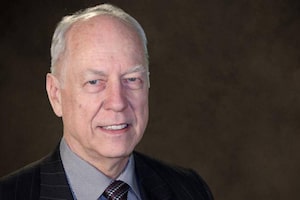Lloyd Axworthy and Paul Heinbecker are, respectively, the chair and deputy chair of the World Refugee Council, a group of leaders, practitioners and innovators from around the world, convened by the Centre for International Governance Innovation and supported by the Government of Canada.
Headlines about refugees tell intrinsic truths. Cumulatively they give us the essence of the story. And that essence is distressing. Consider this contemporaneous selection: "Europe turns its back on desperate migrants"; "Hundreds of migrants feared dead in Mediterranean"; "Trump budget cuts refugee resettlement funding"; "Refugee processing has ground to a halt."
These headlines show that the world is increasingly forsaking its refugees. The asylum system is both broken and broke. On World Refugee Day on Tuesday, we should take stock and recommit ourselves to reversing the retreat from humanity that these headlines expose.
Global refugee statistics are as inconvenient as they are cruel. According to the UN High Commissioner for Refugees, nearly 22 million people, half of them children, have fled for their lives from conflicts. Only 50 per cent of these children have access to primary education, compared with a global level of more than 90 per cent. For older children, the gap becomes a chasm: Only 22 per cent of refugee adolescents attend secondary school. Just 1 per cent of refugees attend university.
Opinion: Refugee crisis: Canada can take the lead on long-term solutions
In an accident of geography, 90 per cent of the world's refugees are hosted by 10 neighbouring states, most of which have scarcely the resources to look after their own people let alone the needs of destitute refugees. Refugee-receiving states have moral and often treaty-based obligations not to forcibly return people to a country where they legitimately fear for their lives.
Other states have no comparable legal obligation to share the attendant responsibilities. Although a small number of states – including Canada – resettle refugees, much of the world's response to refugee flows is discretionary and inadequate, even downright callous and hostile.
To put the refugee story partly into perspective, it is instructive to compare it to the experience of Canadians fleeing the recent floods across the country where thousands of people were forced to abandon their homes at a moment's notice, taking with them whatever they could carry. Now imagine that if like refugees, these Canadians would not be able to return to their homes for 20 years, the average time that a modern-day refugee can expect to spend in exile. Think of the impact on children's health and education and on the family's prospects for a normal life.
South Sudan, the world's newest state and simultaneously the world's fastest growing refugee crisis, is the latest example of rich country apathy, and worse. Renewed violence between tribal factions has forced the flight of nearly two million refugees amid a deepening human disaster. Humanitarian agencies have appealed for $1.4-billion (U.S.) to support the refugees in neighbouring states but donors have pledged to provide only 14 per cent of required funds. Yes, only 14 per cent.
Countries in the region struggling to help the refugees, like Uganda, are warning that they might not be able to carry on much longer, considering the burden they are shouldering and the miserly response thus far from donors. This leaves much of the international community with a difficult but real choice to make: Do we share the responsibility of mitigating another spiralling refugee crisis or do we just watch it descend into a vortex of preventable human catastrophe? And do we finally begin to renovate the system?
The UN High Commissioner for Refugees, Filippo Grandi, has called the current historical juncture a "watershed moment for the refugee cause." It can get worse but it also can get better.
This is not the first time that the world has faced large and complex refugee situations. The current system was designed by states in the aftermath of the Second World War to respond to the needs of 55 million people displaced by the war. In the late 1980s, millions of boat people in Southeast Asia were rescued. Canada was a principal beneficiary of the Indochinese resettlement program as we have been of other forced migrations, including those of the Hungarians, former Czechoslovaks, Chileans, Ismailis, former Yugoslavs and others. In today's world, with a population of 7.4 billion, refugees amount to just one in every 350 people. Responding to their needs is eminently achievable. And it is a moral obligation.
It is manifestly in the interests of all states to fix the broken refugee system. What is needed are innovations in public policy, new forms of international co-operation and governance, novel approaches to financing and business development to empower refugees, and new technologies to facilitate solutions for their plights. Political leaders, civil society and business need to unite to change the refugee narrative from one of risk to one of opportunity. No country is better placed than Canada to lead that effort.
 Paul Heinbecker
Paul Heinbecker